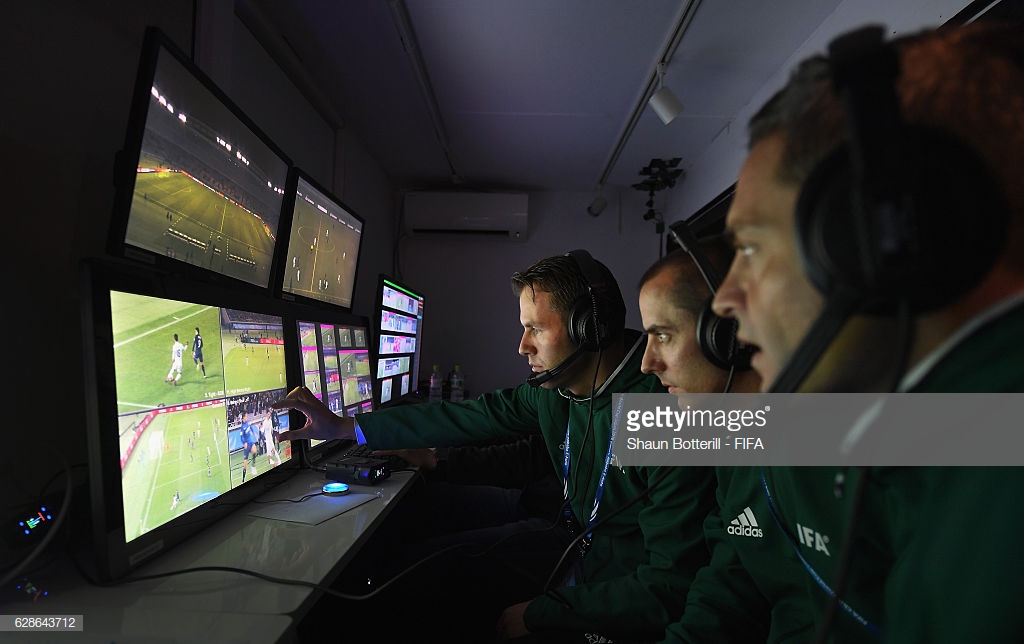In the World Cup it was a success. It is undoubtedly the next step in officiating football matches. It will change the game and the manner in which it is played for the better.
Simulation will be reduced, goals won't be ruled out because the referee took up a poor position in the build-up play and, maybe, it will reduce the torment and excruciating focus on one single mans decision on the pitch.
And yet, next season, the Premier League will be the only major European league to not use Video Assistant Referees (VAR) - a decision that the league may well regret.
There was an expectation that FIFA's decision to use VAR at the World Cup last month was going to backfire and show that there is still a long way to go in perfecting the use of the system at the elite level. Was it too soon? Too much of a jump?
Practice makes perfect
There had been examples - the FA Cup Fourth Round at Anfield between Liverpool and West Brom comes to mind - where VAR had had a major impact, and not entirely for the right reasons. Lengthy delays and an audience - both inside the stadium and sitting at home watching on the television - that were very much in the dark as to the decisions being reviewed and why, added uncertainty but also drama.
However, the issues that have been witnessed in England in the FA Cup, where VAR was used last season during selected matches, mainly centered on the officials using the system and not the technology itself. The process and infrastructure are practically faultless; the people operating them are not.
The referees on the pitch and the additional officials watching from HQ require a tremendous amount of training and, more importantly, experience to make VAR as close to a faultless process as possible. It is apparent that the more that it has been used, the slicker the use has become. But naturally there are still anomalies; and it is these anomalies that those who disagree with the introduction of the technology latch onto and use as ammunition.
Premier League will be the odd one out
VAR will be present in Serie A, Bundesliga, Ligue 1 and, even the much maligned poorly organised, La Liga. Officials across the leagues will gain the experience that can allow the system to flourish. But Premier League matches will not be graced with the presence of VAR just yet.
Maybe league officials were perturbed by the rather embarrassing showing in the Bundesliga last season when players of both Mainz and Freiburg had to return to the pitch during half-time to take a penalty as the referee was only alerted of a possible mistake in judgment after he had blown for the end of the half.
Or possibly they were left aghast as the VAR project manager was removed from his position in Germany because he had allegedly influenced a VAR decision that involved his hometown club Schalke.
Despite these mishaps and misuses of the system, there is a need for it to be introduced and will eventually make the game better. It will aid the referee to make the correct decisions in the decisive areas of the match when fitness and mental agility are being pushed to the limit. It is no longer possible to expect the one referee on the pitch to, not only keep up with play but also, ensure that he is in the best position to view a piece of action that is yet to take place. The 30-odd cameras situated in every nook-and-cranny of stadiums can help him and the game. The Premier League will rue not introducing the technology this season - the league, supposedly the best in the world - will appear behind the times.
World Cup showed how VAR can work
The recent World Cup proved that the trepidation going into the tournament was unfounded. There were one or two issues - the last round of matches in Group B will certainly be reviewed by Fifa's Head of Refereeing Pierluigi Collina and his team - but again they were down to the inexperienced officials involved and not the system itself.
The technology was called upon on many occasions during the groupstages in Russia, and it continued to show its worth. Decisions involving penalties and offsides were dealt with minimal fuss and speedy judgment; goals worthy of making it to the scoresheet were allowed to do so. In the later stages, due to there being fewer matches each day, it appeared that VAR was being used less - it wasn't. Perhaps this signifies it working – it was going unnoticed.
Lack of understanding is holding VAR back
The problem with a lot of the talk surrounding VAR is that those talking do not know how and why it is being used. The coverage from even the national broadcasters is ill-informed when it comes to VAR; their analysis is providing the watching public with the wrong end of the stick. A lack of understanding is apparent, as those broadcasters who should know the rules simply do not.
Rio Ferdinand on the BBC stated in the studio in Russia that he did not know why the referee ‘didn’t go to VAR’ on a certain occasion. The reason, simply, is because the referee never ‘goes to VAR’ but rather the VAR alerts the referee of a decision that he may want to reconsider with the aid of replays and multiple camera angles. Such is the misinformed analysis that spreads across many different media outlets that causes many supporters to lament VAR for the wrong reasons.
Players even are guilty of misinterpreting the use of the system, as on many occasions they themselves have gone up to referees to sign an imaginary rectangular box believing that that somehow will encourage them to reverse a decision. It is this understanding of how the system works that is crucial to it being a success and embraced.
However, unlike the rest of the major European leagues, VAR will not be embraced by the Premier League in the coming season. There will be times during the campaign when people – even maybe those opposed to VAR – question as to how VAR would have addressed a situation and, more often than not, for the better. The referees in England will have to wait to receive their much-needed experience of using the technology in a match situation for a little while longer. The Premier League has made its decision but it is one that should have been reviewed.






































